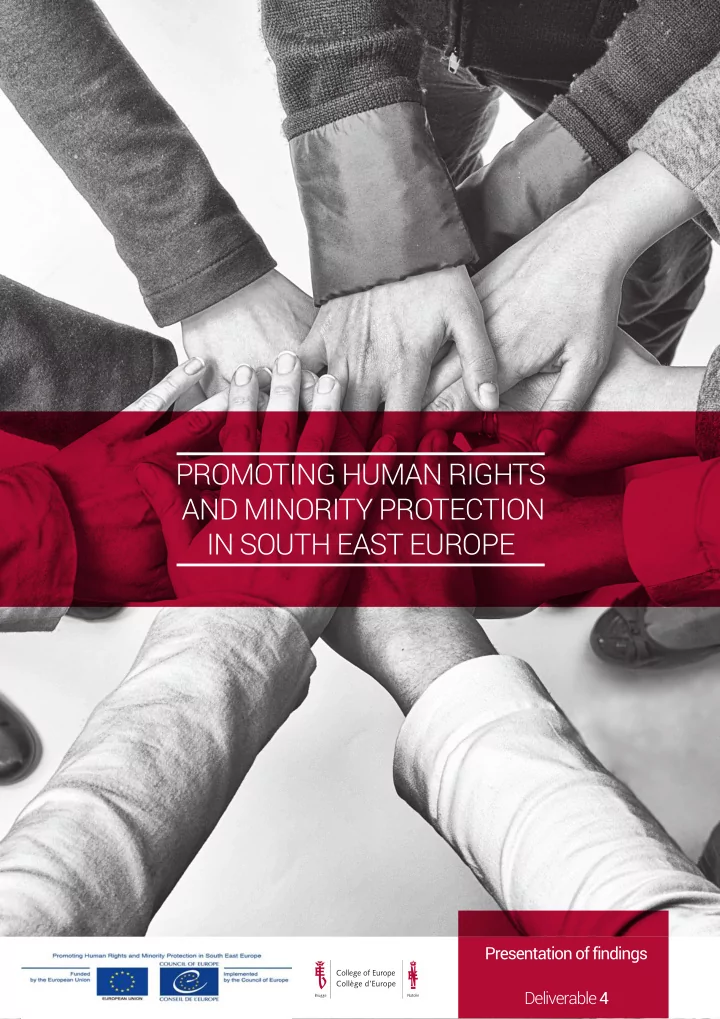

PROMOTING HUMAN RIGHTS AND MINORITY PROTECTION IN SOUTH EAST EUROPE Presentation of findings Deliverable 4
Contents 1. Introduction ............................................................................................................................................................. 2 Main Findings................................................................................................................................................................ 3 2. Awareness of minority rights: key findings ................................................................................................ 4 3. Assessment of the projects: key findings ..................................................................................................... 8 Differences between municipalities .................................................................................................................... 8 Difference in methodology ...................................................................................................................................... 8 Projects with the most success factors ............................................................................................................... 9 Target groups ................................................................................................................................................................ 9 Relevance of the project ........................................................................................................................................ 10 Organisational capacity ......................................................................................................................................... 10 Cooperative capacity ............................................................................................................................................... 11 4. Next steps ............................................................................................................................................................... 14 5. Conclusions ............................................................................................................................................................ 15 6. Annex 1 – Methodological note ..................................................................................................................... 17 Methodology ............................................................................................................................................................... 17 Target group ............................................................................................................................................................... 19 Five project capacities ............................................................................................................................................ 19 Process .......................................................................................................................................................................... 21 Tools: project summaries and score-sheets .................................................................................................. 21 Expectations from the assessments ................................................................................................................. 22 1
1. Introduction The history of the Western Balkans and of the minorities in the region is a complex jigsaw puzzle. The definition of national and/or ethnic and linguistic minorities has changed over time and is not uniform in all the beneficiaries and entities in the region. From the moment in which these beneficiaries affirmed their national sovereignty since the break-up of the Former Yugoslavia and the transition in Albania, they have been gradually adopting regional, international and EU proposed standards and norms. The EU accession process in which some beneficiaries are taking part and to which others aspire requires for potential EU candidates to ratify and implement the Framework Convention for the Protection of National Minorities (hereafter Convention)and the European Charter for Regional or Minority Languages (hereafter Charter) in order to satisfy the political criteria to join the EU. The Convention and the Charter commit South East Europe to ensure protection of minorities and their rights. However, the individual beneficiaries and entities have unevenly ratified and implemented these conventions. Croatia, Serbia, Bosnia and Herzegovina, and Montenegro have all ratified, whereas Kosovo* 1 is still unable to do so due to its status; Albania and ‘former Yugoslav Republic of Macedonia’ still need to sign and ratify the Charter. The slow progress on constitutional changes in Bosnia and Herzegovina means that outside the three ‘constituent nationalities’, 2 minority rights are still dramatically short of being respected. The European Court of Human Rights’ (ECtHR) rulings on the right for minorities to hold office have not been implemented through constitutional change yet. Progress has been made, though, in legislation, with recognition of 17 national minorities and the educational needs of Roma. Croatia holds a distinction between ‘old’ minorities, such as the Italians, and ‘new’ ones, such as the Serbs who were not seen as a minority before 1991. Even the tools for identifying minorities in the region are uneven. For instance, Bosnia and Herzegovina has conducted a new census to replace the 1991 one, but its results have not been published yet. 'The former Yugoslav Republic of Macedonia' has not been able to renew the census of 2002 due to politically contentious methodological disagreements. In light of this situation, the Council of Europe (CoE) and the European Union (EU) are actively pursuing several projects to improve national minority rights in the entire region. In particular, the project “Promoting Human Rights and Minority Protection in South East Europe” aims at improving access to rights for minorities at various levels of government (but especially at local level), based upon the CoE’s standards in this field. The project aims at improving access to rights for minorities by: • supporting local governments’ capacity to enhance policies and to implement recommendations on minority rights in practice in a number of municipalities in the region; • identifying and sharing good practices at local government level and by developing models which can be adapted to other municipalities in the region; • supporting changes at the national/central government level in the legislative and policy fields, using the findings from experiences at the local level together with those from CoE monitoring reports. In the course of the project to promote human rights and protection of minorities in South East Europe, 36 municipalities in seven beneficiaries were selected to implement small-scale projects to ensure basic services for minorities. From February 2015 onwards, these projects have been implemented by Municipal Taskforces, assisted by project consultants engaged by the CoE. A Research Team gathered by the College of Europe in Bruges (Belgium) composed by 1 * This designation is without prejudice to positions on status and is in line with UNSCR 1244 and the ICJ opinion on the Kosovo Declaration of Independence. 2 Bosniak, Croat and Serbian. 2
Recommend
More recommend